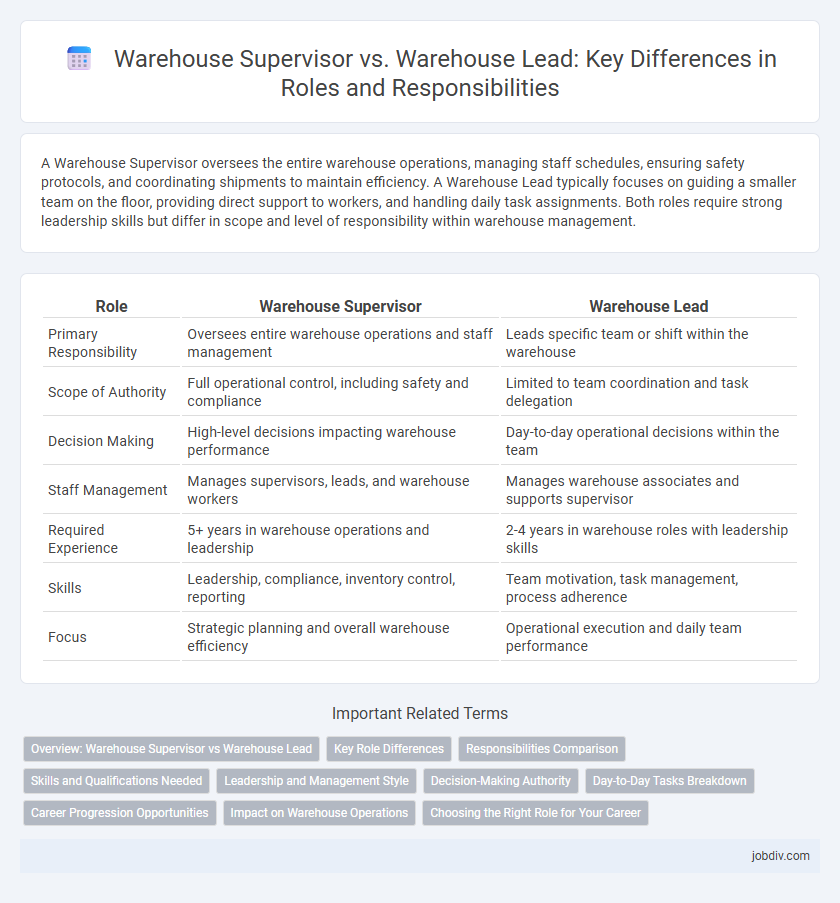A Warehouse Supervisor oversees the entire warehouse operations, managing staff schedules, ensuring safety protocols, and coordinating shipments to maintain efficiency. A Warehouse Lead typically focuses on guiding a smaller team on the floor, providing direct support to workers, and handling daily task assignments. Both roles require strong leadership skills but differ in scope and level of responsibility within warehouse management.
Table of Comparison
| Role | Warehouse Supervisor | Warehouse Lead |
|---|---|---|
| Primary Responsibility | Oversees entire warehouse operations and staff management | Leads specific team or shift within the warehouse |
| Scope of Authority | Full operational control, including safety and compliance | Limited to team coordination and task delegation |
| Decision Making | High-level decisions impacting warehouse performance | Day-to-day operational decisions within the team |
| Staff Management | Manages supervisors, leads, and warehouse workers | Manages warehouse associates and supports supervisor |
| Required Experience | 5+ years in warehouse operations and leadership | 2-4 years in warehouse roles with leadership skills |
| Skills | Leadership, compliance, inventory control, reporting | Team motivation, task management, process adherence |
| Focus | Strategic planning and overall warehouse efficiency | Operational execution and daily team performance |
Overview: Warehouse Supervisor vs Warehouse Lead
Warehouse Supervisors oversee overall warehouse operations, including staff management, workflow coordination, and ensuring safety compliance, while Warehouse Leads focus on direct team guidance, task delegation, and supporting daily operational efficiency. Supervisors typically hold greater responsibility for strategic planning, performance evaluation, and inventory control. Warehouse Leads act as intermediaries between workers and supervisors, driving productivity and maintaining order on the warehouse floor.
Key Role Differences
Warehouse Supervisors oversee overall warehouse operations, ensuring compliance with safety protocols, managing inventory accuracy, and coordinating staff schedules. Warehouse Leads focus more on direct team management, guiding daily tasks, monitoring workflow efficiency, and providing hands-on support to warehouse workers. The Supervisor holds higher responsibility for strategic planning and reporting, while the Lead emphasizes operational execution and team motivation.
Responsibilities Comparison
Warehouse Supervisors oversee overall warehouse operations, including managing inventory accuracy, coordinating shipments, and ensuring compliance with safety regulations. Warehouse Leads focus on directing daily floor activities, such as assigning tasks to team members, monitoring workflow efficiency, and addressing immediate operational issues. The Supervisor role emphasizes strategic planning and cross-department coordination, while the Lead handles hands-on team leadership and execution of warehouse processes.
Skills and Qualifications Needed
Warehouse Supervisors require strong leadership, inventory management, and logistics coordination skills, often supported by certifications like OSHA safety training and experience with warehouse management systems (WMS). Warehouse Leads need hands-on operational expertise, effective communication abilities, and basic problem-solving skills, typically gained through on-the-job experience or vocational training. Both roles benefit from knowledge of supply chain processes, but Supervisors emphasize strategic oversight while Leads focus on daily team guidance.
Leadership and Management Style
Warehouse Supervisors focus on strategic leadership, overseeing overall warehouse operations, staff performance, and resource allocation to ensure efficiency and safety. Warehouse Leads adopt a hands-on management style, directly guiding team members on the floor, facilitating daily tasks, and addressing immediate operational challenges. Both roles require strong communication and leadership skills, but Supervisors emphasize long-term planning and policy enforcement while Leads concentrate on day-to-day team coordination and workflow optimization.
Decision-Making Authority
Warehouse Supervisors hold higher decision-making authority than Warehouse Leads, overseeing overall operational strategies and resource allocation within the facility. Warehouse Leads typically manage daily team tasks and workflow but escalate complex decisions to Supervisors. Effective warehouse management depends on clearly defined roles where Supervisors guide performance optimization and Leads ensure tactical execution on the floor.
Day-to-Day Tasks Breakdown
Warehouse Supervisors oversee overall warehouse operations, manage staff schedules, ensure compliance with safety protocols, and handle inventory control. Warehouse Leads focus on directing daily activities on the floor, such as coordinating order picking, loading shipments, and monitoring team productivity. Both roles require strong organizational skills, but Supervisors have broader managerial responsibilities while Leads emphasize hands-on task coordination.
Career Progression Opportunities
A Warehouse Lead typically oversees daily operations and guides team members, serving as a stepping stone to higher management roles. Warehouse Supervisors manage larger teams with responsibilities including performance evaluation, training, and strategic planning, offering broader career advancement opportunities. Progression from Lead to Supervisor often leads to roles such as Warehouse Manager or Operations Manager, emphasizing leadership development and operational expertise.
Impact on Warehouse Operations
A Warehouse Supervisor oversees the entire warehouse operations, ensuring efficiency, safety protocols, and inventory accuracy, which directly impacts productivity and order fulfillment rates. The Warehouse Lead supports daily tasks by coordinating team activities and maintaining workflow continuity, influencing employee performance and operational consistency. Both roles are critical, but the supervisor's strategic decisions typically have a broader impact on overall warehouse effectiveness and cost management.
Choosing the Right Role for Your Career
Warehouse Supervisors oversee overall warehouse operations, managing inventory control, staff scheduling, and safety compliance to ensure efficient workflow. Warehouse Leads focus more on direct team guidance, training, and daily task delegation on the floor, enhancing team productivity and operational accuracy. Choosing the right role depends on your career goals: Warehouse Supervisor suits those seeking broader managerial responsibilities, while Warehouse Lead is ideal for individuals aiming to build hands-on leadership experience within warehouse teams.
Warehouse Supervisor vs Warehouse Lead Infographic

 jobdiv.com
jobdiv.com